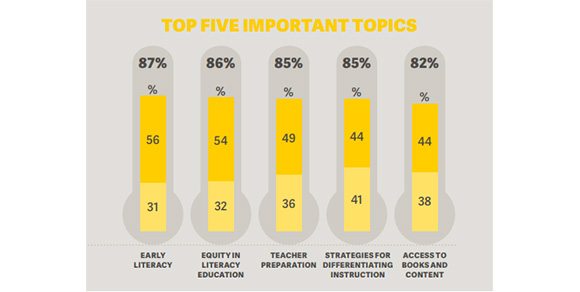
The International Literacy Association regularly conducts a survey of literacy leaders to find out what topics in literacy are trending and which topics are the most important. The most recent survey was open from August to September 2017. It had 2,097 responses representing 91 countries and territories. Classroom teachers made up the largest portion of respondents (27%).
The survey asks respondents to rank 17 topics as a “hot” or trendy topic, and rank the same topics on importance. “Early literacy” and “strategies for differentiating instruction” were the only two topics ranked in the top five as both a hot topic and as an important topic. Eighty-seven percent of respondents ranked “early literacy” as very or extremely important and 85% of respondents ranked “strategies for differentiating instruction” as very or extremely important.
Two interesting findings about respondents were: 1) “K-12 educators are more likely than those in academia to say early literacy is extremely important” and 2) “International respondents are more likely than U.S. respondents to say that summative assessments are important.” Across all respondents, “summative assessment,” often a test at the end of a unit or year, was ranked the least important of all topics, but ranked third for trendiness.
Topics with high importance but low trendiness rankings are seen as areas that need more attention. “Access to books and content” ranked fifth in importance and eleventh as hot topic. “Digital literacy” ranked first in trendiness, but thirteenth in importance, indicating that respondents perceive it as a less important topic that is nonetheless receiving a lot of attention.
Libraries can use this information as partners in literacy with schools and communities. Since digital literacy ranked low in importance on this survey, libraries can engage in conversations about what digital literacy means in different contexts. The standout importance of early literacy in the survey is an excellent common ground for libraries to continue to build partnerships. Libraries can also continue to bring attention to the key issue of access to books and content, where they have expertise to offer.
The full report can be found here.
Note: This post is part of our series, “The LRS Number.” In this series, we highlight statistics that help tell the story of the 21st-century library.